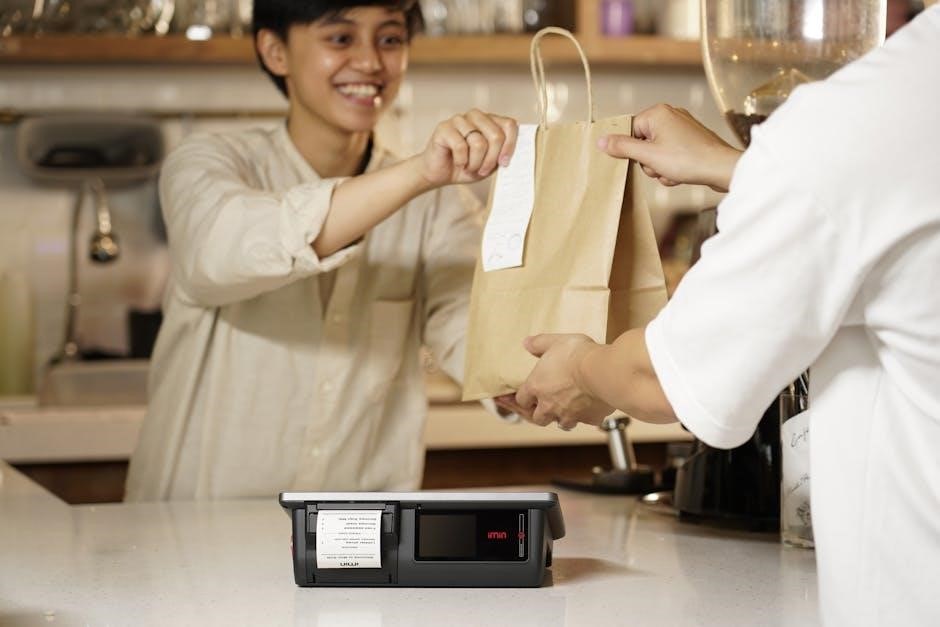Executive Summary
A well-structured café business plan is essential for success, outlining objectives, market analysis, and financial strategies. Understanding the industry, target market, and operational needs ensures sustainability and growth.
Business Objectives
The café aims to establish itself as a premier destination for high-quality coffee and exceptional customer experiences. Key objectives include gaining a 20% market share within the first two years, achieving customer satisfaction ratings of 90%, and maintaining a profit margin of 15%. The café will focus on sourcing ethically produced ingredients, fostering a welcoming atmosphere, and offering innovative menu options. By implementing efficient operational strategies and investing in staff training, the business will ensure long-term sustainability and growth, positioning itself as a leader in the competitive coffee shop industry while building strong community ties.
Mission Statement
Our mission is to create a welcoming and inviting atmosphere where customers can enjoy premium-quality coffee, crafted with care and passion. We are committed to sourcing ethically produced ingredients and fostering a culture of sustainability. By offering innovative menu options while honoring traditional flavors, we aim to provide a unique experience that exceeds expectations. Our dedication to exceptional service, quality, and community engagement drives us to build lasting relationships with our customers. We strive to be a trusted gathering place, enriching lives one cup at a time while supporting local suppliers and promoting environmental responsibility.
Keys to Success
- Gaining hands-on experience in café management to understand operational challenges and customer expectations.
- Developing a detailed business plan that outlines financial projections, market strategies, and operational efficiency.
- Utilizing proven business plan templates to ensure comprehensive coverage of all critical aspects.
- Focusing on high-quality products, exceptional customer service, and a unique brand identity to differentiate from competitors.
- Building strong relationships with suppliers to maintain consistent product quality and cost-effectiveness.
- Creating a welcoming atmosphere that fosters customer loyalty and encourages repeat business.

Company Description
Jedi Café, owned by Mr. Obewon Kinobi, operates as a small, independently managed business. The owner oversees all decisions, ensuring a focus on quality and customer satisfaction.

Business Overview

Jedi Café aims to provide a welcoming atmosphere, serving high-quality organic and specialty coffee. Owned by Mr. Obewon Kinobi, the café focuses on customer satisfaction and sustainability. By offering a variety of coffee blends and complementary food options, Jedi Café seeks to become a community hub. The business emphasizes ethical sourcing and eco-friendly practices, appealing to health-conscious consumers. With a simple organizational structure, the owner oversees all operations, ensuring personalized service and consistent quality. This approach enables Jedi Café to build strong customer relationships and establish a loyal clientele in a competitive market.
Organizational Structure
Jedi Café operates with a straightforward organizational structure, ideal for its small-scale nature. Mr. Obewon Kinobi, the owner, assumes full responsibility for major decision-making and oversees all business activities. This centralized approach ensures efficient operations and personalized service. The owner directly manages staff, handles customer relations, and monitors daily operations. While the structure is simple, it allows for agile decision-making and a strong focus on quality. This setup is designed to foster a cohesive work environment and maintain high standards, enabling Jedi Café to deliver exceptional customer experiences and build lasting relationships within the community.
Products and Services
The café offers a variety of specialty coffees, teas, and light meals, ensuring high-quality ingredients and presentation. Services include dine-in, take-out, and catering options for all customers.
Menu Offerings
The café features a diverse menu with specialty coffee drinks, organic teas, and fresh-baked pastries. Seasonal offerings include signature lattes and sandwiches, catering to both breakfast and lunch crowds. The menu emphasizes locally sourced ingredients, ensuring freshness and quality. Vegan and gluten-free options are available to accommodate diverse dietary needs. Pricing is competitive, with premium options for unique flavors. Regular menu updates reflect customer preferences and seasonal availability, maintaining a dynamic and appealing selection for all patrons.
Pricing Strategy
The café employs a competitive pricing strategy, balancing affordability with quality. Specialty coffee drinks range from $4 to $6, while teas and pastries are priced between $3 and $5. Premium options, such as organic or vegan items, are slightly higher. Discounts are offered for loyalty program members and bulk purchases. Seasonal promotions and happy-hour deals attract repeat customers. The pricing structure ensures profitability while remaining accessible to a broad audience, fostering customer loyalty and long-term sustainability.
Quality Standards
The café is committed to maintaining high-quality standards in all offerings. Ingredients are sourced from reputable suppliers, ensuring freshness and sustainability. Coffee beans are ethically sourced and roasted locally for optimal flavor. Pastries and food items are prepared daily in-house using organic and natural ingredients. Staff undergo rigorous training to maintain consistency in drink preparation and customer service. Regular quality audits are conducted to ensure adherence to health and safety regulations. This commitment to excellence fosters trust and loyalty among customers, positioning the café as a premium destination for coffee and food enthusiasts.
Market Analysis
The coffee shop industry is growing rapidly, driven by increasing consumer demand for specialty coffee and experiential dining. Targeting health-conscious individuals and young professionals, the café aims to capitalize on this trend by offering high-quality, ethically sourced products in a welcoming environment.
Industry Overview
The coffee shop industry is experiencing steady growth, fueled by increasing consumer demand for specialty coffee and unique dining experiences. With rising health consciousness, customers are gravitating toward ethically sourced, organic, and high-quality products. The market is highly competitive, with both chain and independent cafes vying for market share. However, there is significant opportunity for differentiation through innovative menu offerings, sustainable practices, and a welcoming atmosphere. Understanding these trends is crucial for positioning the café to meet customer expectations and stand out in a crowded market. A well-researched industry overview ensures alignment with current and future market demands.
Target Market
The target market for the café includes young professionals, students, and families seeking high-quality coffee and a welcoming atmosphere. The primary demographic is individuals aged 18-45, living or working nearby, who value convenience and premium products. Health-conscious consumers and those interested in organic options are also key targets. The café will appeal to locals looking for a community hub and tourists exploring the area. By understanding these groups’ preferences, the café can tailor its offerings to meet their needs, ensuring strong customer loyalty and consistent foot traffic. This focused approach will drive long-term success and customer satisfaction.
Competitive Analysis
The café will operate in a competitive market, with local coffee shops and chain outlets offering similar products. Key competitors include established chains known for their convenience and loyal customer bases, as well as independent shops praised for their unique atmospheres. To differentiate, the café will focus on superior quality, personalized service, and a welcoming environment. By offering a diverse menu, including organic and specialty options, the café will attract health-conscious and discerning customers. Understanding competitors’ strengths and weaknesses will enable the café to position itself effectively, ensuring a strong market presence and customer loyalty. This analysis will guide strategic decisions to outperform rivals.
Marketing Strategy
Developing a strong brand identity and implementing effective promotions will attract and retain customers. Strategic marketing efforts focus on building loyalty and driving consistent foot traffic.
Branding and Promotion
Branding and promotion are critical for attracting and retaining customers. Develop a unique brand identity that reflects the café’s mission and values. Utilize social media platforms, email marketing, and loyalty programs to engage customers. Create appealing promotional campaigns highlighting menu offerings and special deals. Partner with local businesses for cross-promotions and host events to build community connections. Ensure consistent messaging across all channels to strengthen brand recognition. Invest in high-quality visuals and storytelling to differentiate from competitors. Regularly monitor customer feedback to refine marketing strategies and maintain a strong online presence.
Customer Acquisition
Effective customer acquisition strategies are vital for attracting and retaining patrons. Conduct market research to identify target demographics and tailor offerings to their preferences. Implement promotions, discounts, and loyalty programs to encourage repeat visits. Leverage digital marketing, including social media campaigns and email newsletters, to engage potential customers. Host events and workshops to build community connections and drive foot traffic. Partner with local businesses for referrals and co-promotions. Ensure excellent customer service to foster positive word-of-mouth referrals. Monitor customer feedback to refine strategies and improve satisfaction, ensuring long-term growth and loyalty.
Operations Plan
A well-organized operations plan ensures efficient cafe management, focusing on optimal location, effective supply chain, and high-quality equipment. Proper staff training and workflow optimization are essential.
Location and Layout
Selecting a prime location with high foot traffic, such as near offices or universities, is crucial for visibility and accessibility. The café should be situated in an area with ample parking and pedestrian activity. Inside, the layout must be welcoming, with a clear flow for customers to order, pick up their drinks, and find seating. The design should maximize space efficiency, ensuring easy movement for both staff and customers. Incorporating comfortable seating areas and modern decor will enhance the customer experience. Additionally, the layout should prioritize accessibility, including seating for individuals with disabilities. A well-planned location and layout are key to operational success and customer satisfaction.
Supply Chain Management
A well-structured supply chain is vital for ensuring consistent quality and cost efficiency. Sourcing high-quality ingredients from reliable suppliers is essential for maintaining customer satisfaction. Building strong relationships with suppliers ensures timely deliveries and competitive pricing. Implementing an inventory management system will help track stock levels and minimize waste. Regular monitoring of supplier performance and product quality is necessary to maintain standards. Additionally, exploring sustainable sourcing options can enhance the café’s reputation and appeal to eco-conscious customers. A robust supply chain strategy supports operational efficiency and contributes to the café’s long-term success and profitability.

Financial Plan
A comprehensive financial plan outlines revenue projections, expense management, and break-even analysis. It ensures sustainability, secures funding, and attracts investors for long-term growth and profitability.
Revenue Projections
Revenue projections outline expected income over a specific period, ensuring financial sustainability. They are based on menu pricing, foot traffic, and sales trends. For a café, average monthly sales of $30,000 to $50,000 are typical, depending on location and customer base. Annual projections may range from $360,000 to $600,000. These estimates are refined using historical data and market research. Regular reviews and adjustments ensure accuracy. Detailed financial templates, like those in café business plan PDFs, provide structured frameworks for realistic forecasting, helping owners and investors understand growth potential and financial health.
Break-Even Analysis
A break-even analysis calculates the point at which a café’s revenues equal its expenses, ensuring profitability. It considers average sale per customer, daily foot traffic, and fixed costs like rent and utilities. For example, if a café has $10,000 in monthly fixed costs and an average sale of $5, it needs 2,000 customers monthly to break even. This analysis helps owners understand financial thresholds and make informed pricing and operational decisions. Regular reviews ensure alignment with changing market conditions and business performance, guiding strategies to maintain profitability and long-term sustainability.
Funding Requirements
The funding requirements section outlines the capital needed to launch and grow the café. Initial startup costs include location rental, equipment, inventory, and marketing. Ongoing expenses like staff wages and utilities must also be considered. Funding can be sourced through loans, investors, or personal savings. A detailed breakdown of how funds will be allocated ensures transparency for investors. This section also highlights financial projections, demonstrating how the café will achieve profitability and repay investments; A clear funding plan is crucial for securing support and ensuring the café’s long-term viability in a competitive market.

Risk Management
Identifying potential risks like market competition and operational challenges is crucial. Implementing mitigation strategies, such as contingency plans and diversifying offerings, ensures business resilience and long-term stability.

Potential Risks
The café business faces risks such as intense competition, economic downturns, and changing consumer preferences. Supply chain disruptions and rising costs of ingredients can impact profitability. Additionally, operational challenges like staffing shortages, regulatory compliance, and unexpected equipment failures pose threats. Market saturation in urban areas may limit growth, while economic instability could reduce customer spending on non-essential items like specialty coffee. These risks require proactive planning to ensure business continuity and adaptability. A comprehensive risk management strategy is essential to mitigate these challenges and safeguard long-term success in the competitive café industry.
Mitigation Strategies
To address potential risks, diversify menu offerings to attract a broader customer base and adapt to market trends. Build strong relationships with multiple suppliers to ensure ingredient availability and negotiate favorable terms. Invest in staff training to improve retention and service quality, reducing operational disruptions. Implement a robust financial planning strategy, including an emergency fund, to weather economic fluctuations. Utilize digital tools for inventory management and customer engagement to enhance efficiency and loyalty. Regularly monitor market trends and competitor activities to stay competitive. By proactively addressing these risks, the café can maintain stability and achieve long-term growth in a dynamic market environment.

Exit Strategy
The café aims to achieve long-term sustainability, with potential exit options including sale, franchise expansion, or ownership transfer, ensuring profitability and legacy in the market.
Long-Term Goals
The café aims to expand to multiple locations within five years, establishing a strong brand presence. It seeks to become a community hub, fostering customer loyalty through quality and sustainability. Long-term goals include diversifying the menu, adopting eco-friendly practices, and achieving financial stability. The café plans to invest in staff training and technology to enhance efficiency. Building strategic partnerships and exploring franchise opportunities are also key objectives. By focusing on innovation and customer satisfaction, the café strives to create a lasting legacy in the food and beverage industry while maintaining its commitment to excellence and community engagement.
Potential Exit Options
The café may explore sale to a larger food and beverage company or private equity firm. Franchise expansion is another viable option, allowing the brand to scale nationally or internationally. Alternatively, the owner may opt to transfer ownership to family members or key employees. A management buyout could also be considered, ensuring continuity. Additionally, the café could be positioned for acquisition by a rival chain seeking market expansion. Strategic planning will ensure a smooth transition, maximizing value for stakeholders while preserving the brand’s legacy and customer loyalty built over the years.

Appendix
Additional resources include business plan templates, market research reports, and financial tools to support café operations and strategic decision-making.
Additional Resources
Various templates and guides are available to support café business planning. ProjectionHub offers a coffee shop business plan template with financial projections. BizPlanTemplates provides a comprehensive café plan with sample content. IMARC Group’s Organic Food Cafe Business Plan includes market analysis and operational strategies. Upmetrics offers a step-by-step guide with 400 sample plans. These resources provide practical tools, financial models, and market insights to help entrepreneurs create detailed and effective business plans, ensuring a strong foundation for launching and managing a successful café.
References
Key resources for developing a café business plan include templates from ProjectionHub, BizPlanTemplates, and IMARC Group. ProjectionHub offers financial projections tailored for coffee shops, while BizPlanTemplates provides comprehensive examples. IMARC Group’s Organic Food Cafe Business Plan includes detailed market analysis. Upmetrics offers a step-by-step guide with 400 sample plans. These resources provide practical tools, financial models, and market insights to help entrepreneurs create detailed and effective business plans, ensuring a strong foundation for launching and managing a successful café. Additional guides and templates are available online to support café business planning.
